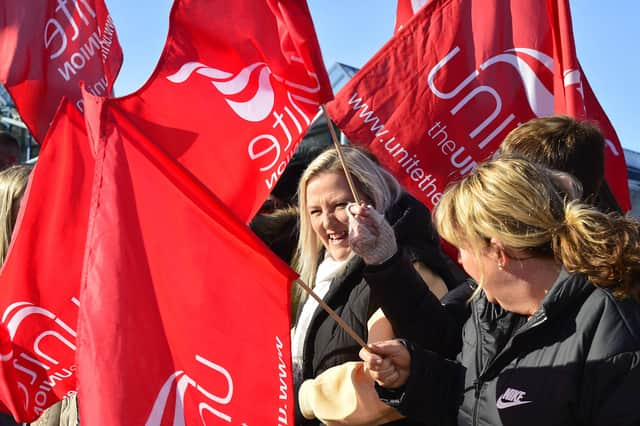SPRINGTIME OF DISCONTENT: List of workers going on strike over pay in Northern Ireland - and how much they want


And as you can read below, some of the Province’s top trade union figures think there is more to come.
The industrial unrest is being fuelled in large part by rampant inflation, which the Bank of England currently puts at 6.2% (in short, meaning that a basic basket of goods costs 6.2% more today than it did the same time last year).
Advertisement
Hide AdAdvertisement
Hide AdThe trade unions argue that for every year they get a pay rise below the rate of inflation, workers are actually taking a pay cut in real-life terms.
WHO IS STRIKING AND WHAT DO THEY WANT?
The industrial unrest gripping parts of Northern Ireland deepened today with the news that bus drivers are set to walk off the job in a dispute over pay.
For the last few weeks a ballot has been underway involving about 1,400 Unite staff and 500 GMB staff who run the Province’s bus services (this includes drivers, cleaners, and shunters, who handle the vehicles in the depots).
Today it was revealed that a majority of those who voted had chosen industrial action – something Unite said could “paralyse all bus services across Northern Ireland”.
Advertisement
Hide AdAdvertisement
Hide AdThe GMB and Unite unions had set their sights on a 6% pay hike, but Translink offered 3%.
No date has yet been set for strike action; the unions will consult members in the coming week about it.
Train workers are not involved in this action.
Here are some of the other developments recently:
<> Unite members in the Education Authority were out on strike yesterday, having voted to reject a 1.75% pay offer.
<> Unite members in the Province’s 11 councils (including binmen and leisure centre staff) had been on strike earlier in March, alongside Housing Executive workers (such as repairmen), after rejecting the same 1.75% offer.
Advertisement
Hide AdAdvertisement
Hide Ad<> Meanwhile UNISON members in the health service are signalling that strike action could come this autumn – with pay again at the root cause (see below).
<> In February an amalgam of five teaching unions rejected a pay deal (believed to be worth 3.2% over two years), and said they were holding out for a 6% hike.
And whilst no ballot has yet been announced, this week they said that the failure to agree pay terms is “a recipe for trouble”.
<> In mid-March workers at Belfast’s Spirit Aerosystems (formerly Bombardier) voted to strike over pay.
Advertisement
Hide AdAdvertisement
Hide Ad<> Today NIPSA said that its members who work in the Stormont Assembly will vote on industrial action from April 8 to April 29.
This dispute centres on pay, but it also involves demands for staff to return to work in the office, which some employees are resisting.
COULD NHS STAFF WALK OFF THE JOB TOO?
Anne Speed, head of bargaining at UNISON, said yesterday that a 3% pay offer for her health workers was “completely inadequate” and that they are starting a campaign to up the pressure on the government for a higher figure.
UNISON has about 26,000 health members in NI, including nurses, social workers, porters, cleaners, and more, and Ms Speed was asked if their pay dispute could end up in industrial action.
Advertisement
Hide AdAdvertisement
Hide Ad“If we don’t get a serious response... you could be looking at a very discontented workforce in the autumn,” she said.
“We’ll use every means possible to influenceWestminster government, and any new devolved government.
“We’d do everything we can using campaigning actions, lobbying, everything, before we’d use the final tool in the box – which would be industrial action.
“Hopefully that scenario will not unfold [and] we’ll get to the negotiating table, not the picket line. But if we’re forced to the picket line, we will go there.”
Advertisement
Hide AdAdvertisement
Hide AdOwen Reidy – the assistant general secretary of the Irish Congress of Trade Unions told the News Letter: “It is no surprise to me that we are seeing a surging number of examples of strikes on the issue of pay lately.
“I expect we will see more. Workers organised in unions have clearly had enough.”
Meanwhile Davy Thompson, Unite deputy regional secretary, told the News Letter that, in about 30 years as a trade union official, “I don’t remember a time like this, when there is so much [action] in terms of workers willing to go and fight for what they’re worth”.
For more political news, click here:
Advertisement
Hide AdAdvertisement
Hide Ad——— ———
A message from the Editor:
Thank you for reading this story on our website. While I have your attention, I also have an important request to make of you.
With the coronavirus lockdowns having had a major impact on many of our advertisers — and consequently the revenue we receive — we are more reliant than ever on you taking out a digital subscription.
Subscribe to newsletter.co.uk and enjoy unlimited access to the best Northern Ireland and UK news and information online and on our app. With a digital subscription, you can read more than 5 articles, see fewer ads, enjoy faster load times, and get access to exclusive newsletters and content.
Visit
https://www.newsletter.co.uk/subscriptionsnow to sign up.
Advertisement
Hide AdAdvertisement
Hide AdOur journalism costs money and we rely on advertising, print and digital revenues to help to support them. By supporting us, we are able to support you in providing trusted, fact-checked content for this website.
Ben Lowry, Editor